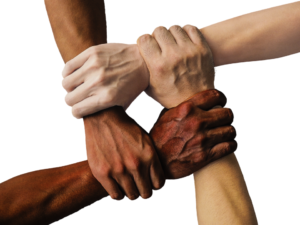 ARAOMC: Antiracism, Antioppression, Multicultural
ARAOMC: Antiracism, Antioppression, Multicultural
JUUstice Washington is on a journey to increasingly manifest its valuing of equity, diversity, and inclusion in our social and environmental justice work. We are an organization recently birthed from the merger of two other social justice organizations that were disproportionately comprised of people who hold unearned privilege in one or more systems of privilege/oppression. This pattern continues in our current organization, and we are committed to dismantling the institutional oppression we have inherited and un/knowingly perpetuate.
We invite you to join us in learning about the impact of privilege and oppression on people and organizations, as well as how to measurably counter that impact. We’ll be compiling more resources in the future as we discover which have been most helpful to us in our journeys. For now, here are few resources we recommend related to racism:
Racism
Did you know that the Unitarian Universalist Association is actively working to dismantle institutional racism in the Association and and encourages the work at the congregational level? At the General Assembly in July 2024, delegates voted to revise Article II of the UUA Bylaws. This revision was the result of an extensive effort to expand the definitions of what we as UUs value most and weave into those values a stronger statement of antiracism, anti-oppression and multicultural priorities as we all as being inclusive of non-human life. The UUA also launched materials for making this transition through its Widening the Circle of Concern program.
Multicultural resources with the UUA include:
- Black Lives of Unitarian Universalism (BLUU)
- Diverse & Revolutionary UU Multicultural Ministries (DRUUMM)
- Transgender Religious professional UUs Together (TRUUsT)
- Taproot: A National BIPOC Space
- Sister SoUUrce (Black UU women and girls (womxn, LGBTQIA+ and non-binary inclusive))
- Allies for Racial Equity
- 8th Principle
- More info at: Anti-Racism, Multiculturalism, and Belonging and Racial Justice.
One norm of predominantly white institutions is the centering of white needs, experiences, perspectives, and emotions. Unitarian Universalism is no exception. Centering: Navigating Race, Authenticity, and Power in Ministry invites readers to listen to the personal stories of religious leaders of color as they describe their experience of “exercising power, agency, and authority in a culturally White denomination.”
Many white people think that racism consists only of acts of blatant racial bias, bigotry, and violence. Dr. Camara Jones’ gardening analogy about the different levels of racism broadens that view. She shares her model—as well as other allegories—in her TEDx talk here.
Are you a white person who feels uncomfortable talking about racism? In White Fragility: Why It’s So Hard for White People to Talk About Racism, Robin DiAngelo explores both what gets in the way of effective conversations about racism and how to engage more constructively.
White-dominated organizations typically struggle to dismantle institutional racism even when they value equity, diversity, and inclusion. Racial Equity Tools provides resources that help organizations “transform their policies, procedures, practices, culture and relationships to be racially equitable and inclusive.”
At JUUstice Washington’s 2018 Justice Summit, plenary speakers Cynthia Good and Kyana Wheeler presented, “Equity, Diversity, and Inclusion Tools for Our Justice Toolbox.” Their session handouts include a Tools Review as well as General Resources to help participants learn more about equity, diversity, and inclusion.
JUUstice Washington recognizes that gathering together across issues and social groups will inherently involve power differentials and that we will have varying degrees of awareness of those dynamics. Our Guidelines for JUUstice Washington Gatherings aim to make our meetings less oppressive of those of us who are targeted by systems of privilege and oppression. You are welcome to use our guidelines at your meetings, too.